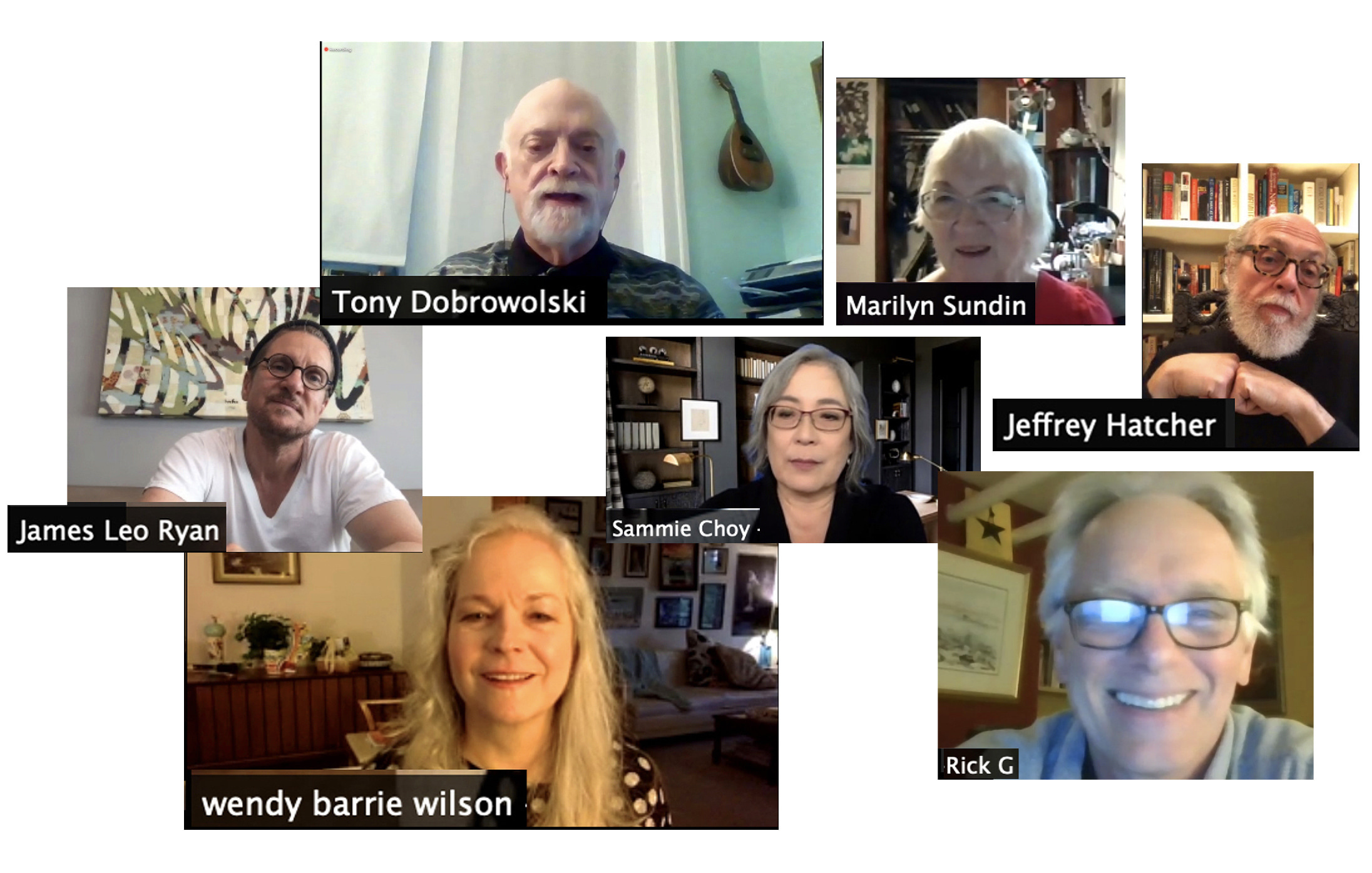The two actors in the play’s last scene speak their final lines, then pause within their separate frames until an offscreen voice pronounces, “end of play.” A mosaic of colorful rectangles quickly fills the computer monitor with the faces of other actors and the audience, turning on their cameras and microphones. Laughter, clapping, and convivial chat between audience and actors quickly turn to comments, questions, and a close discussion of the play and its impact.
Zoom theater was born of necessity, as abruptly as the arrival of the COVID virus last winter, which closed down venues and indefinitely scrapped live performances across the country and around the world. Everything about theatre production was suddenly impossible, and as in every other area of life, after a sigh of grief and frustration as their livelihoods stalled, performers started reaching for technology.
Chicago actor Tony Dobrowolski, who was an assistant professor/designer in theatre at Denison from 1977-1982, got to it right away when the cancelation of his tour was confirmed. “Theatre is a communal exercise, not a solo art. I felt the need to surround myself with artists I had worked with in the past.”
Some of his many contacts in the field included a durable network of Denisonians from decades ago. Dobrowolski proposed weekly play readings on Zoom so actors could keep connected with one another for morale purposes and professional support to remain active in their craft. Readings with the group began April 1 with Thornton Wilder’s “Our Town,” and they’ve continued weekly through three seasons and the pandemic, under the banner of “The Ubiquitous Players.” There are now nine playwrights involved with the group, and they alternate between performing new work and more familiar plays.
“I still feel very close to a number of the students from my time at Denison. The camaraderie that grew in a special place, at a special time, has sustained many of us for 40-plus years,”says Dobrowolski. “I continue to keep up with Denison alumni who have gone on to varied successful careers, many no longer involved in theatre.”
One who has always remained in theatre is Wendy Barrie-Wilson ’78, who returned to Denison from her acting career in New York in 2011 as a Reynolds Playwright-in-Residence, then an assistant professor of theatre for six years. Not only has she joined with Dobrowolski’s venture, she’s produced some of her own work over Zoom, and continues to connect with recent alumni from her time teaching at Denison, extending their theatre educations with reading and discussions, including bringing them into the performances and discussions with the Ubiquitous Players.
Barrie-Wilson saw an interesting fit for the plays of Harold Pinter in the Zoom venue, with its emphasis on language and ideas more than staging, costumes, and physical interaction. She resurrected a Pinter play that had been part of her Denison senior theatre project more than 40 years earlier, “Old Times.” She also tracked down the original cast of that student production: playwright Jeffrey Hatcher ’80 and Sammie Choy ’79, who joined her in readings of “Betrayal” along with Rick Grubbs ‘80. Further productions have included James Leo Ryan ’85 in Los Angeles and Marilyn Sundin, an accomplished actress and well known by alumni as the coordinator for Denison’s theatre department for nearly 30 years.
A live theatrical experience can’t be replicated with a technology conferencing program. This is especially true for the actors, who respond to and work with the energy of a live audience and the physical presence of other actors with them on a stage. But Zoom does offer an audience the benefits of close listening without distractions like coughing and whispering, not to mention a comfortable seat in their own home.
The players have been gradually adding more theatrical embellishments to the original model of simple Zoom readings. In a recent production of “Doubt” by John Patrick Shanley, partial costuming was introduced as a way of defining characters, and elements of staging were employed, for instance the illusion of sharing a pot of tea between three characters who were actually separated by many miles and several time zones. It appeared effortless and tied the separated actors more closely into a shared digital space.
“In this pandemic,” says Barrie-Wilson, “society has been asking itself ‘what’s essential in our lives?’ And theater has this same kind of chance to take a hard look at what’s essential in theater.”
Dobrowolski points to the inherent need in humans to share their stories. “Theatre is the mechanism through which artists work communally, to present stories of humanity and, hopefully, truth.”
Barrie-Wilson sees the present form of theatre as the way “to explore this time we’re living through. How history remembers it will come through artists, and the stories they share with us all.”

